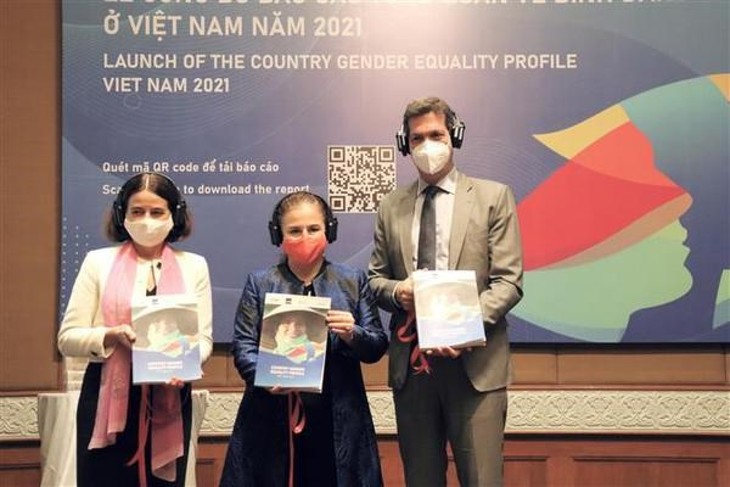(VOVWORLD) -Country Gender Equality Profile Vietnam 2021 (CGEP), the first comprehensive report on the gender equality situation in Vietnam, was released at a meeting on Tuesday by the UN Women, the Australian Embassy in Vietnam, the Asian Development Bank and the International Labor Organization.
 Australian Ambassador to Vietnam Robyn Mudie, Country Representative of UN Women in Vietnam Elisa Fernandez Saenz and ADB Country Director in Vietnam Andrew Jeffries at the launching ceremony of the report. (Photo: VNA) Australian Ambassador to Vietnam Robyn Mudie, Country Representative of UN Women in Vietnam Elisa Fernandez Saenz and ADB Country Director in Vietnam Andrew Jeffries at the launching ceremony of the report. (Photo: VNA) |
Upon addressing the event, Elisa Fernandez Saenz, country representative of UN Women in Vietnam, said that this marks the first time that an overall report on gender equality was announced in the country. The report indicates that gender equality is not a marginal issue, but is instead at the core to the quality, permanence, and progress of Vietnamese socio-economic development.
Since 2000, the country has carried out national gender assessments every five years. In line with this, the inter-sectoral effort aims to provide an overall view on progress that the nation has gained in major indications, such as gender equality, while simultaneously providing an analysis and recommendations aimed at dealing with obstacles in the field whilst reducing the gender gap.
The report therefore serves as a helpful information source which assists the mainstreaming of gender equality during the preparations for the Sustainable Development Cooperation Framework Engagement (UNSDCF) in the 2022 to 2027 period. Moving forward, the CGEP is expected to play the role as a guide in supervising the implementation progress of the Sustainable Development Goals in the nation through a gender responsive lens.
The report features the knowledge, advice, and consultancy of many agencies and individuals, including the Department of Gender Equality under the Ministry of Labour, Invalids and Social Affairs, the General Statistics Office, as well as both domestic and foreign experts.
It provides a number of recommendations to Vietnamese State agencies on how to make wide-range changes relating to the gender equality situation. This primarily focuses on three major action areas, such as accelerating the implementation of existing commitments on gender equality, removing fundamental barriers to gender equality, and promoting the progress in gender equality over the next decade.